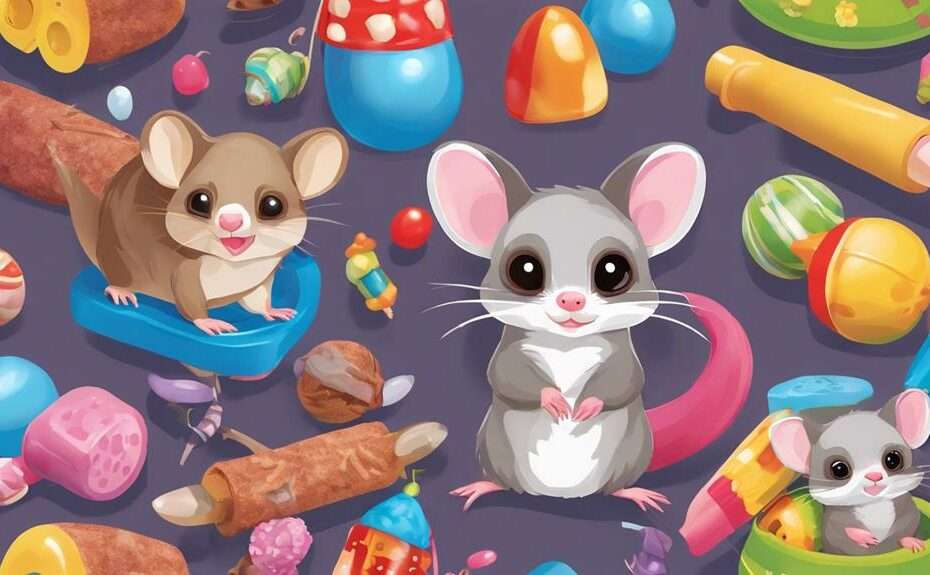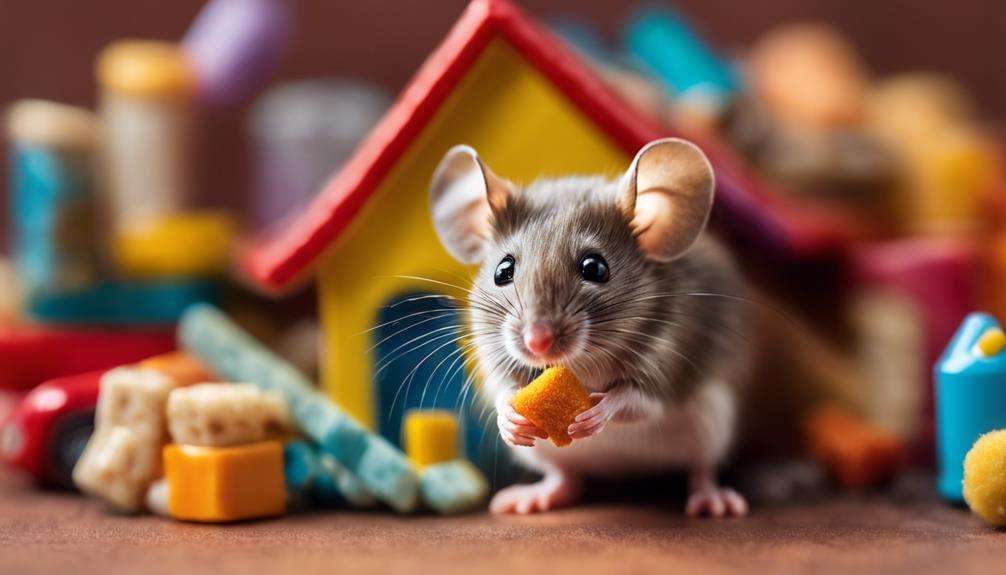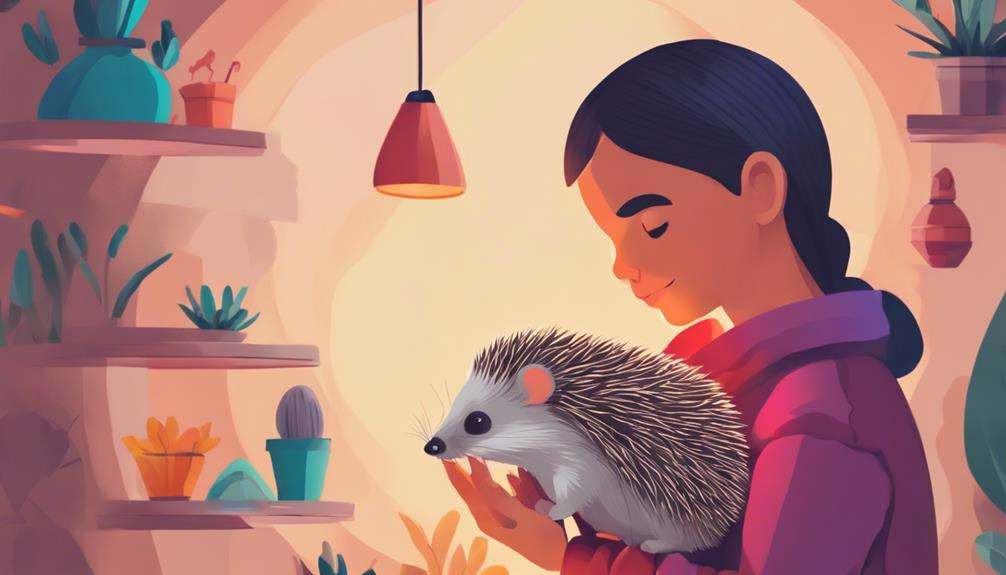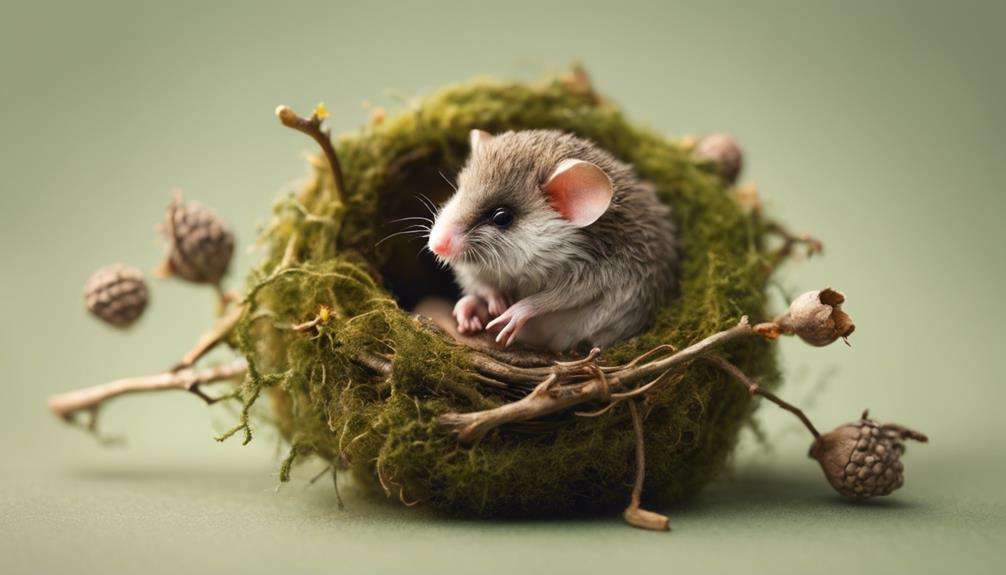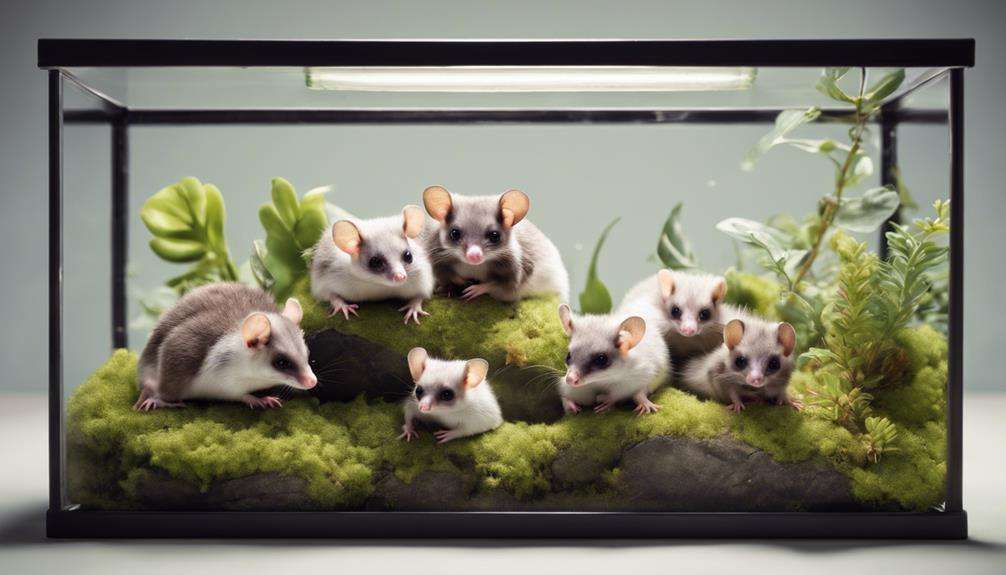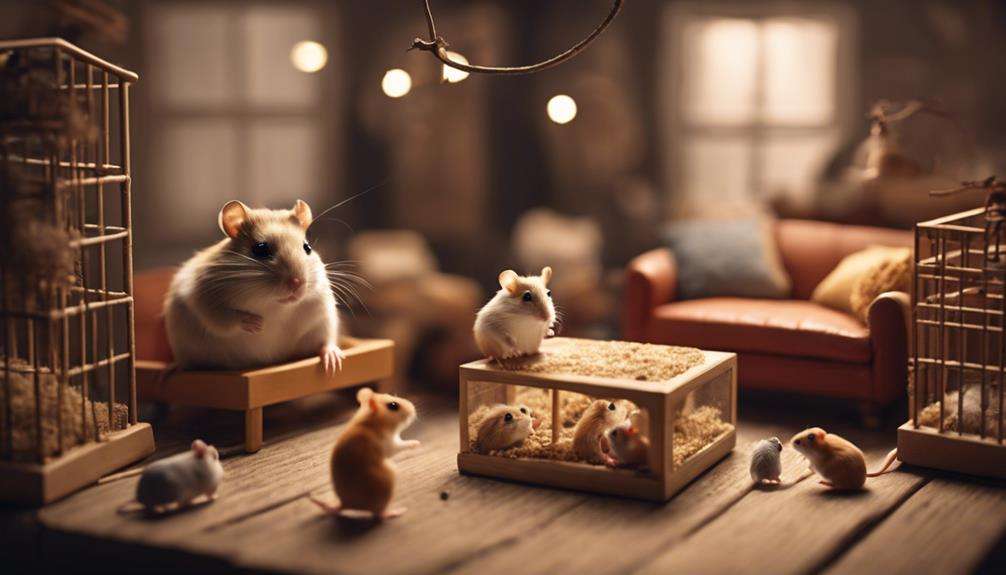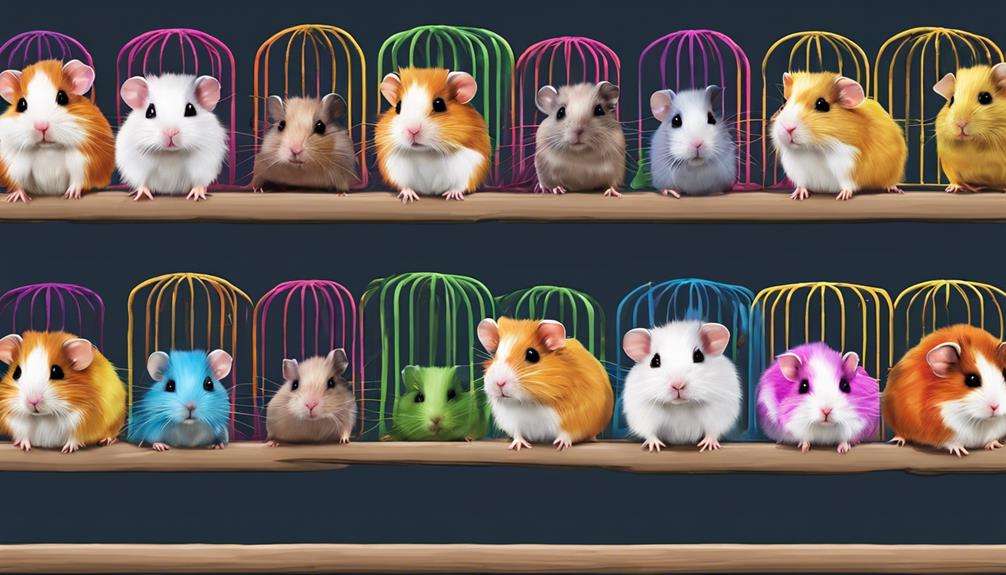When considering adopting quirky small mammals, understanding their unique needs is key. From commitment to legalities, each aspect plays an important role in providing a suitable environment for these unconventional pets.
However, there's one critical factor that often gets underestimated, impacting the well-being of these adorable creatures. By unraveling this mystery, you'll be better equipped to start on this exciting journey of caring for quirky small mammals.
Key Takeaways
- Understand unique small mammals' habitat needs and dietary requirements for responsible care.
- Seek specialized resources, reputable rescues, and veterinary guidance for exotic small pets.
- Provide suitable habitats with enrichment, mental stimulation, and proper diet for well-being.
- Build strong bonds through patient interaction, training, and respect for their individual needs.
Adoption Requirements for Unique Mammals
Do you understand the specific habitat needs and dietary preferences required for adopting unique mammals?
When considering small mammals for adoption, it's important to be well-informed about their habitat requirements. Small mammals such as hamsters, gerbils, and mice need appropriate enclosures that provide ample space for exercise, hiding spots for security, and bedding for comfort. These animals are burrowers by nature, so cages with deep bedding are essential for their well-being. Additionally, small mammals have varying dietary needs; for example, hamsters are omnivores that require a mix of high-quality pellets, fresh fruits, and vegetables.
Understanding the natural behaviors and characteristics of small mammals is key to providing them with a suitable living environment. Being aware of their nocturnal habits, social needs, and potential medical issues is important for their overall health and happiness. Adoption counselors can offer valuable insights into the specific needs of different small mammal species, helping potential adopters make informed decisions.
Understanding Quirky Small Mammal Diets
When caring for small mammals, understanding their quirky diets is vital to their well-being. Each species has specific dietary needs, from high-protein options for insectivores like hedgehogs to vitamin C-rich foods for herbivores like guinea pigs. Providing a balanced diet tailored to your small mammal's nutritional requirements is essential for their overall health and happiness.
Diet Variety
Understanding the quirky diets of small mammals is essential for their best health and well-being. Small animals have diverse dietary needs, ranging from herbivores to omnivores and insectivores. It's important to grasp their dietary preferences and nutritional requirements to guarantee their best health.
Providing a balanced diet that consists of fresh hay, vegetables, and pellets is essential for their overall well-being. Different small mammal species may have specific dietary requirements based on their natural habitats and behaviors. By maintaining a varied diet for these quirky small mammals, you can help prevent nutritional deficiencies and promote their overall health.
Nutritional Needs
To guarantee the peak health and well-being of small mammals, it's imperative to grasp their diverse dietary needs and preferences. Different small mammal species, such as herbivores, omnivores, and insectivores, have specific dietary requirements essential for their health.
Understanding these dietary needs is important for providing top-notch nutrition. Offering a balanced diet comprising fresh hay, vegetables, and pellets is key to meeting their nutritional needs. It's important to regularly monitor and adjust the diet according to each small mammal's requirements to guarantee their well-being.
Proper nutrition not only contributes to their overall health but also plays a significant role in extending the longevity of these quirky small mammals available for adoption.
Health Considerations for Unusual Adoptions
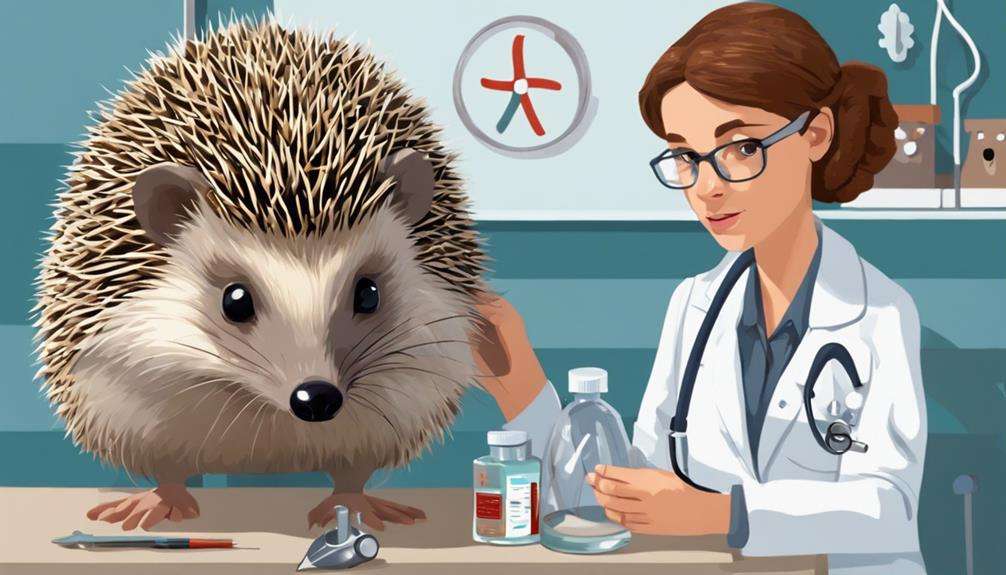
Researching and understanding the unique health requirements of the specific small mammal species you're considering for adoption is essential for their well-being. When it comes to guinea pigs, for example, it's important to provide them with a diet high in vitamin C, as they can't produce this essential nutrient themselves.
Consult with a veterinarian experienced in exotic pet care to receive guidance on health maintenance and potential challenges specific to your chosen species. Be prepared for potential specialized medical needs or dietary restrictions that may be necessary for certain quirky small mammals.
Regular veterinary check-ups are vital for early detection of health issues and ensuring the well-being of your unusual small mammal companion. Consider the long-term commitment and financial responsibility associated with providing proper healthcare for exotic small mammals to make sure they lead healthy and happy lives.
Creating a Special Habitat for Exotic Mammals
Considering the health requirements discussed earlier, now let's move on to creating a specialized habitat for exotic mammals. Exotic pets have unique habitat needs that must be met to ensure their well-being.
When setting up a habitat for exotic mammals, it's important to consider their specific requirements. Provide ample space for climbing, burrowing, or exploring, depending on the species' natural behaviors. Incorporate enrichment items such as tunnels, branches, or hiding spots to promote mental and physical stimulation.
Researching the exotic mammal's dietary needs and feeding preferences is essential to support their best health and overall well-being. Consulting with exotic mammal experts or veterinarians can offer valuable guidance on creating a specialized habitat tailored to your pet's needs.
Bonding Tips With Uncommon Small Pets
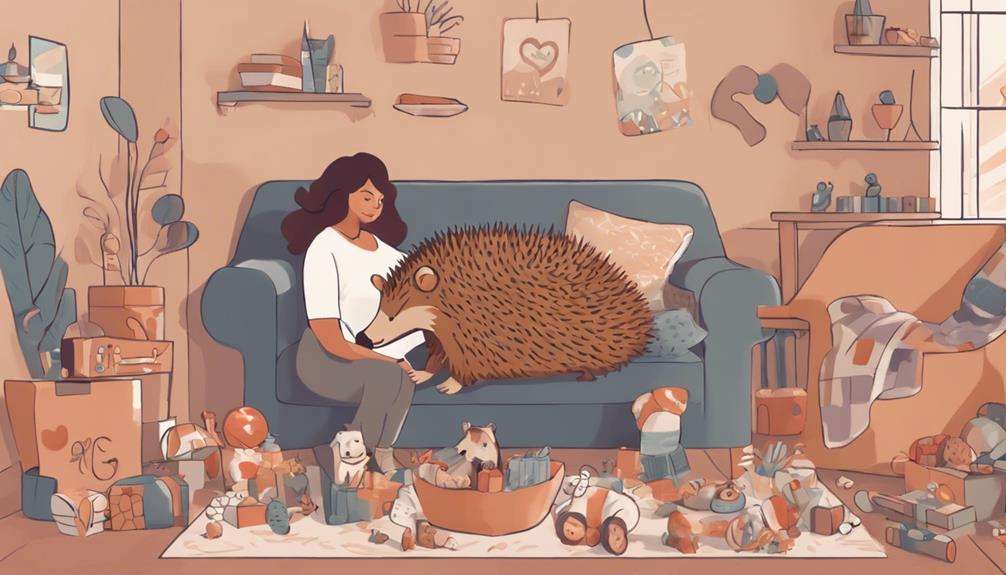
To build a strong bond with uncommon small pets, engage in bonding activities tailored to their unique needs and preferences.
Use effective communication techniques, such as observing their body language and responding appropriately, to establish trust and understanding.
Remember to be patient, consistent, and respectful of their individuality to foster a deep connection with quirky small mammals.
Bonding Activities for Unusual Pets
When bonding with uncommon small pets like sugar gliders and hedgehogs, engaging in interactive playtime and socialization activities can greatly strengthen the human-animal bond. Adopting a small exotic pet comes with the opportunity to provide unique treats and snacks, creating positive associations and building trust.
Grooming sessions, such as gentle brushing or nail trimming, can serve as bonding experiences for both you and your unusual pet. Training exercises like teaching tricks or commands can enhance communication and reinforce the bond.
Additionally, creating a safe and enriching environment with hiding spots, climbing structures, and interactive toys can promote bonding and mental stimulation for your uncommon small mammal. These activities not only strengthen the relationship but also ensure the well-being and happiness of your exotic pet.
Communication Techniques With Exotic Animals
Establishing trust with uncommon small pets like sugar gliders and hedgehogs involves consistent handling and positive reinforcement to build a strong bond. Unlike dogs and cats, exotic animals communicate through unique cues that require careful observation.
Use gentle and slow movements to approach them, allowing them to become familiar with your presence. Offering treats and rewards can encourage interaction and reinforce positive behaviors.
Spending important time with exotic pets is important for understanding their preferences and behaviors, facilitating a deeper connection. By respecting their communication style and providing a safe environment, you can establish a strong bond based on trust and mutual understanding.
Legalities of Adopting Unusual Mammals
Before considering adoption of unusual mammals, it's imperative to research local regulations and laws regarding ownership to guarantee compliance and avoid potential legal issues. Understanding legal restrictions surrounding the adoption of unconventional mammals is vital.
Some exotic mammal species may be restricted or prohibited in certain areas due to ecological concerns or zoonotic diseases. Compliance with legal restrictions is essential to make sure the well-being of both the animal and the owner.
To navigate these complexities, consult with relevant authorities or organizations to clarify any uncertainties about the legality of adopting unique small mammal species. By proactively addressing legal considerations, you can make sure a smooth adoption process and provide a safe and suitable environment for your new furry companion.
Finding Specialized Exotic Pet Resources
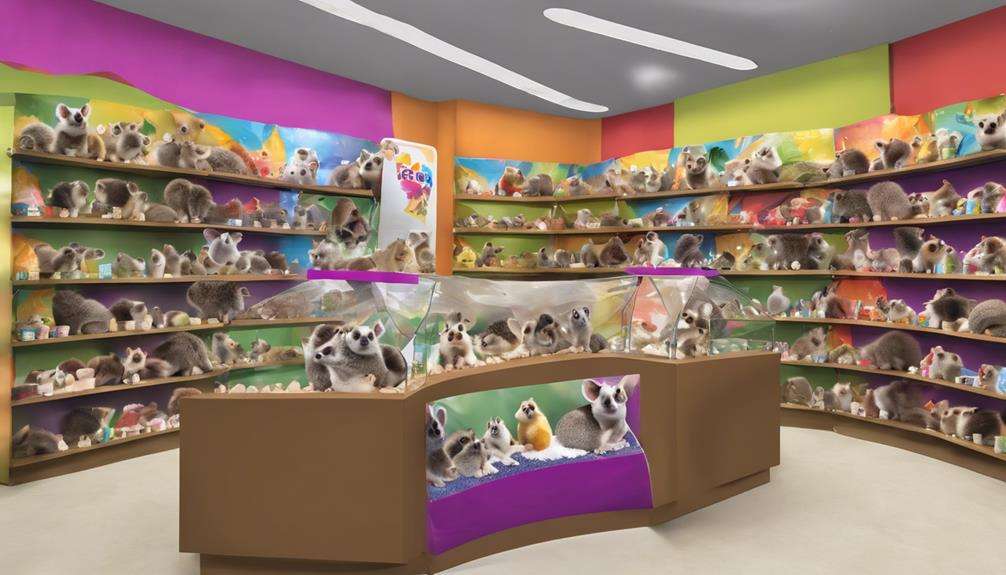
For specialized exotic pet resources, consider collaborating with reputable exotic pet rescues in your area. These rescues often have unique small mammals available for adoption and can provide valuable guidance on their care.
Additionally, utilizing online resources and forums dedicated to exotic pet care and adoption can offer a wealth of information on how to properly care for these relatively easy-to-care-for small mammals.
Attending exotic pet expos and events is another great way to connect with experts and enthusiasts who can provide insights into the specialized care these small mammals require. Seek guidance from exotic pet veterinarians for specific health advice tailored to the needs of these unique animals.
Joining social media groups focused on exotic pet ownership and adoption can also be beneficial, as it allows you to interact with other owners and gain valuable knowledge and support in caring for your new small mammal companion.
Frequently Asked Questions
What Is the Easiest Exotic Pet to Own?
For an exotic pet, consider a hedgehog. They're low maintenance and friendly, making them a great choice. Exotic pet care is important, so make sure you're ready for the commitment before bringing one home.
What Is the Best Small Pet to Adopt?
When considering the best small pet to adopt, small rodents offer companionship and entertainment. Their playful nature and compact size make them ideal for indoor living. Research their specific needs to guarantee a harmonious relationship.
What Is the Coolest Pet to Have?
For the most fascinating pet to have, distinctive reptiles stand out. Their intriguing traits, like regenerative abilities and striking appearances, make them enchanting companions. Consider a bearded dragon or an axolotl for a one-of-a-kind pet experience.
What Is the Friendliest Exotic Pet?
For a friendly exotic pet, consider sugar gliders. Known for bonding closely with owners, these nocturnal creatures can adapt to your schedule. Despite being illegal in some states, their social nature makes them popular.
Conclusion
As you navigate the world of adopting quirky small mammals, remember that with commitment comes great responsibility. By understanding their unique diets, creating a special habitat, prioritizing their health, and being aware of legal considerations, you can provide the best possible care for your new furry friend.
So, take the time to bond with your exotic pet and seek out specialized resources to maintain a happy and fulfilling life together.
